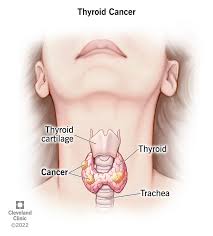Thyroid Cancer
Papillary thyroid cancer, the most common type of thyroid cancer, accounts for approximately 70% of all thyroid cancers. Women are more likely to develop thyroid cancer than men. Although thyroid cancer is more common in patients over the age of 30, it poses a risk for all age groups, and its aggressiveness increases with age.
Symptoms of Thyroid Cancer
Thyroid cancer often develops without any noticeable symptoms. The most common symptom is a lump in the neck. Less common symptoms include hoarseness, voice changes, and difficulty swallowing. Pain symptoms may occur in cases of inflammatory conditions of the thyroid or in rare types of cancer such as medullary thyroid cancer.
Although 75% of the population has at least one thyroid nodule, the vast majority are benign. Young people generally do not have thyroid nodules. However, children and adolescents with thyroid nodules have a significantly higher risk of thyroid cancer than the adult population, even though their nodules are benign.
Nodules that develop with age will be present in 90% of people by the age of 80.
Less than 1% of all thyroid nodules are cancerous. Thyroid nodules are often diagnosed during routine physical examinations and on X-rays taken for other conditions.
Types of Thyroid Cancer
There are four main types of thyroid cancer. The types of thyroid cancer and their incidence are as follows:
- Papillary thyroid cancer:
- Follicular and/or Hurthle cell thyroid cancer:
- Medullary thyroid cancer:
- Anaplastic thyroid cancer:
Papillary thyroid cancer
Papillary thyroid cancer, the most common type of thyroid cancer, originates from follicular cells that produce and store thyroid hormones. Papillary thyroid cancer can occur at any age but most commonly affects people between the ages of 30 and 50.
Follicular thyroid cancer
Follicular thyroid cancer also originates from follicular cells. It usually affects people aged 50 and older. Hurthle cell cancer is a more aggressive type of follicular thyroid cancer, considering its rarity and potential.
Medullary thyroid cancer
Medullary thyroid cancer begins in thyroid cells called C cells, which produce the hormone calcitonin. Elevated levels of calcitonin in the blood may indicate medullary thyroid cancer, even in its very early stages. Certain genetic predispositions increase the risk of medullary thyroid cancer.
Anaplastic thyroid cancer
Anaplastic thyroid cancer is a rare type of cancer that spreads rapidly and is very difficult to treat. Anaplastic thyroid cancer typically occurs in adults aged 60 and older.
Thyroid lymphoma
Thyroid lymphoma is a rare type of cancer that begins in the immune system cells and develops very quickly. Thyroid lymphoma is usually seen in older adults.
Thyroid Cancer Treatments
Thyroid cancer treatment depends on the type and stage of thyroid cancer and the patient’s overall health. Most cases of thyroid cancer are treatable. Thyroid cancer is usually diagnosed through a biopsy, which involves inserting a needle into the thyroid nodule. The tissue is then examined under a microscope by a pathologist to determine whether the nodule is benign or malignant (cancerous). Treatment may include surgery and medication, depending on the pathological diagnosis.









